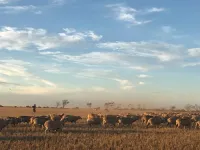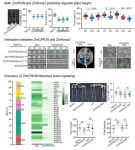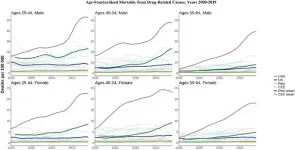(Press-News.org) High temperatures during critical periods of the reproductive cycle of sheep result in 2.1 million fewer lambs produced in Australia each year, costing sheep farmers an estimated $97 million annually.
The work, funded by Meat and Livestock Australia and conducted by a transdisciplinary team of researchers from the University of Adelaide and South Australian Research Development Institute (SARDI), found that days above 32°C during the week of mating caused the significant loss of potential lambs.
Published in Nature Food, the study found annual losses of potential lambs would increase to 2.5 million if median global warming increased by 1°C, and 3.3 million if it increased by 3°C.
“This modelling is important as it demonstrates that heat events threaten the sustainability of sheep production, both within Australia and globally,” says the University of Adelaide’s Associate Professor William van Wettere, who led the study.
Not only does heat stress decrease the number of lambs born, but it can also reduce lamb birthweight by between 0.6–1.4kg.
“If the effects of birthweight are accounted for, economic losses could increase to $168 million under our current climate, and $203 million and $278 million for the 1°C and 3°C temperature scenarios, respectively,” Associate Professor van Wettere says.
The complex research underlying this paper was informed by climate data and modelling conducted by the University’s Professor Seth Westra and Dr Sam Culley, and with contributions from Dr Kathy Gatford of the School of Medicine.
Associate Professor van Wettere and the University of Adelaide and SARDI team are continuing their research into how farmers can adapt their flocks to cope with heat stress.
The research, which is supported by the University’s Davies Livestock Research Centre and South Australian Sheep Industry Fund, showed many sheep are not able to thermoregulate during periods of heat, leading to effects on the animal’s fertility.
“We have identified readily available strategies to improve thermoregulation and improve sheep fertility during summer,” says Associate Professor van Wettere.
“This work is underpinned by multiple years of animal heat stress trials conducted at SARDI’s Turretfield Research Centre in Rosedale and our Roseworthy campus.”
This collaborative research was conducted by SARDI’s Dr Alice Weaver and Dr Alyce Swinbourne, as well as a large group of early-career University of Adelaide researchers.
“Working alongside the SA Drought Resilience Adoption and Innovation Hub and Farming Systems Groups, validation of these outcomes is taking place within commercial flocks across South Australia,” said Associate Professor van Wettere.
“An integral component of this project is also the work of SARDI’s Drs Dane Thomas and Peter Hayman, who developed a tool that producers can use to understand and quantify the impact of heat stress on fertility of their flock.”
The researchers are now investigating whether selectively breeding animals which thermoregulate more effectively can improve the climate resilience of sheep flocks, and how sheep thermoregulation and behaviour affect fertility during periods of heat.
“We are interested to know whether sheep who seek shade or those who are more active during periods of heat are impact differently,” says Associate Professor van Wettere.
“Ultimately, we seek to provide sheep farmers with strategies which they can easily implement to safeguard their enterprise from the impacts of current and future climate,” says Associate Professor van Wettere.
Jane Kellock, a sheep farmer from Farrell Flat, participated in the study and has already implemented some of its findings.
“The use of melatonin to mitigate the impacts of heat has increased our reproduction rates, and just being aware of the heat sensitivity of animals and some of the different things that you can do to help with that,” she says.
“It’s really important that we support these research projects and make sure that some of them are done on farms so that we know it's practical and logistically viable to do these things.”
Associate Professor van Wettere said the collaborative research was an exercise in cross-discipline cooperation and a credit to all involved.
“A project such as this, with such impact on our agriculture sector, is confronting the realities of climate change for the industry,” he said.
END
Excess temperatures cause low flocking concerns
2024-03-21
ELSE PRESS RELEASES FROM THIS DATE:
The maize ZmCPK39-ZmKnox2 module regulates plant height
2024-03-21
This study was led by Professor Mingliang Xu (College of Agronomy and Biotechnology, China Agricultural University, Beijing, China). Through phylogenic analysis, the authors identified a gene encoding a calcium-dependent protein kinase, ZmCPK39, as a candidate gene for plant height regulation in maize. The function of ZmCPK39 in controlling plant height has been verified using gene editing technology. Compared to the wild-type ND101, knockout of ZmCPK39 significantly reduced plant height by 40%.
The authors further ...
New route to recyclable polymers from plants
2024-03-21
Cellulose, abundantly available from plant biomass, can be converted into molecules used to make a new class of recyclable polymers, to sustainably replace some plastics.
Researchers at Hokkaido University have taken a significant step forward in the drive to make recyclable yet stable plastics from plant materials. This is a key requirement to reduce the burden of plastic pollution in the environment. They developed a convenient and versatile method to make a variety of polymers from chemicals derived from plant cellulose; crucially, these polymers can be fully recycled. The method was published in the journal ACS Macro Letters.
Cellulose is one of the most abundant ...
Revolutionizing gastric cancer treatment through personalized 3D bioprinting
2024-03-21
Gastric cancer ranks among the most widespread diseases in Asian populations, with South Koreans experiencing the third-highest incidence globally in 2020, as reported by the International Agency for Research on Cancer. Recently, a collaborative research effort between Pohang University of Science and Technology (POSTECH) and Yonsei University achieved advancement in the realm of precision personalized medicine for gastric cancer. By using 3D bioprinting to accurately replicate the biological environment surrounding gastric cancer cells, the researchers have achieved a significant ...
How neural inhibition could reduce alcohol use
2024-03-21
LA JOLLA, CA—Neuroscientists at Scripps Research have found that inhibiting neurons involved in the body’s stress response may reduce alcohol consumption in people who have both post-traumatic stress disorder (PTSD) and alcohol use disorder (AUD)—even if they still experience trauma-related anxiety.
The findings were published March 21 in Molecular Psychiatry. These discoveries are helping untangle the complex role that stress and trauma play in neurological disorders like PTSD and AUD, while also informing the development of new treatment options for people who experience both these conditions simultaneously.
“Traumatic ...
The Lancet: Dramatic declines in global fertility rates set to transform global population patterns by 2100
2024-03-21
Embargoed access to the paper and contact details for authors are available in Notes to Editors at the end of the release.
By 2050, over three-quarters (155 of 204) of countries will not have high enough fertility rates to sustain population size over time; this will increase to 97% of countries (198 of 204) by 2100.
Pronounced shifts in patterns of livebirths are also predicted, with the share of the world’s live births nearly doubling in low-income regions from 18% in 2021 to 35% in 2100; and sub-Saharan Africa accounting for one in every two children born on the planet by 2100.
In low-income settings with higher fertility rates, better access to contraceptives and female education ...
NHS needs 32 billion cash injection to recover shortfall and help tackle current crisis
2024-03-21
The NHS needs an immediate cash injection of around £8.5bn a year over the next four years to make up a £32bn shortfall in funding and help tackle the current crisis, especially in areas such as waiting times, access to primary care, workforce and capital investment, say experts in the second report of The BMJ Commission on the Future of the NHS.
John Appleby and colleagues argue that, while the government’s recent spring budget funding pledges are a start, they “certainly will not make up the significant shortfall that the NHS ...
Many publicly accessible AI assistants lack adequate safeguards to prevent mass health disinformation
2024-03-21
Effective processes for reporting and responding to safeguard vulnerabilities are also lacking, warn experts
Many publicly accessible artificial intelligence (AI) assistants lack adequate safeguards to consistently prevent the mass generation of health disinformation across a broad range of topics, warn experts in The BMJ today.
They call for enhanced regulation, transparency, and routine auditing to help prevent advanced AI assistants from contributing to the generation of health disinformation.
Large language models (LLMs) are a form of generative AI that have the potential to greatly improve many aspects of society, including ...
New study highlights troubling trends in midlife mortality in the US and UK
2024-03-21
A new study by researchers at the Leverhulme Centre for Demographic Science (LCDS) and Princeton University reveals that US working-age adults are dying at higher rates than their peers in high-income countries; the UK is also falling behind. The study is published today in the International Journal of Epidemiology.
Using annual mortality data from the World Health Organization Mortality Database, the study compared trends in midlife mortality for adults aged 25-64 years between 1990 and 2019 across 15 major causes of death in 18 high-income countries, ...
Nudging the public’s thirst for draught alcohol-free beers could significantly reduce alcohol-associated harms, new study finds
2024-03-21
Making alcohol-free beer more widely available on draught in pubs and bars may help people switch from alcoholic to alcohol-free beer, a new study published in Addiction today [21 March], has found. Pubs and bars taking part in the University of Bristol-led trial saw an increase in sales of healthier non-alcoholic draught beer.
In partnership with Bristol City Council (BCC), researchers from the University’s Tobacco and Alcohol Research Group (TARG) recruited 14 pubs and bars across the city that were willing to change the drinks that they offered on draught for a limited period. Previous research by the same group, using an online experiment as a proxy for real-world behaviour, ...
Millions are at risk using high arsenic water for cooking
2024-03-21
Around 32 per cent of the world's population live in countries that do not adhere to the World Health Organisation’s recommendations on safe limits of arsenic in drinking water
Rice is already known to contain more inorganic arsenic than other cereals
Cooking rice with water containing more than 10 µg L-1 (parts per billion) inorganic arsenic amplifies the risk of arsenic exposure
Long-term exposure to inorganic arsenic in water can cause serious health problems such as cancers, diabetes and pulmonary and cardiovascular diseases
Rice is one of the major cereal crops ...






